Macroeconomics: Cheating in Atlanta Public Schools
VerifiedAdded on 2019/10/31
|5
|896
|126
Essay
AI Summary
This essay delves into the issue of cheating within the Atlanta Public School system, examining the pressures on educators and students that contribute to this problem. It explores the link between standardized test scores and teacher evaluations, the various factors that drive students to cheat, and the concept of plagiarism. The essay also discusses preventative measures, including stricter monitoring and penalties, and analyzes the decision to cheat through a cost-benefit lens, highlighting the economic factors that influence such behavior. The essay concludes by emphasizing the need for a comprehensive approach to address the root causes of cheating in schools.
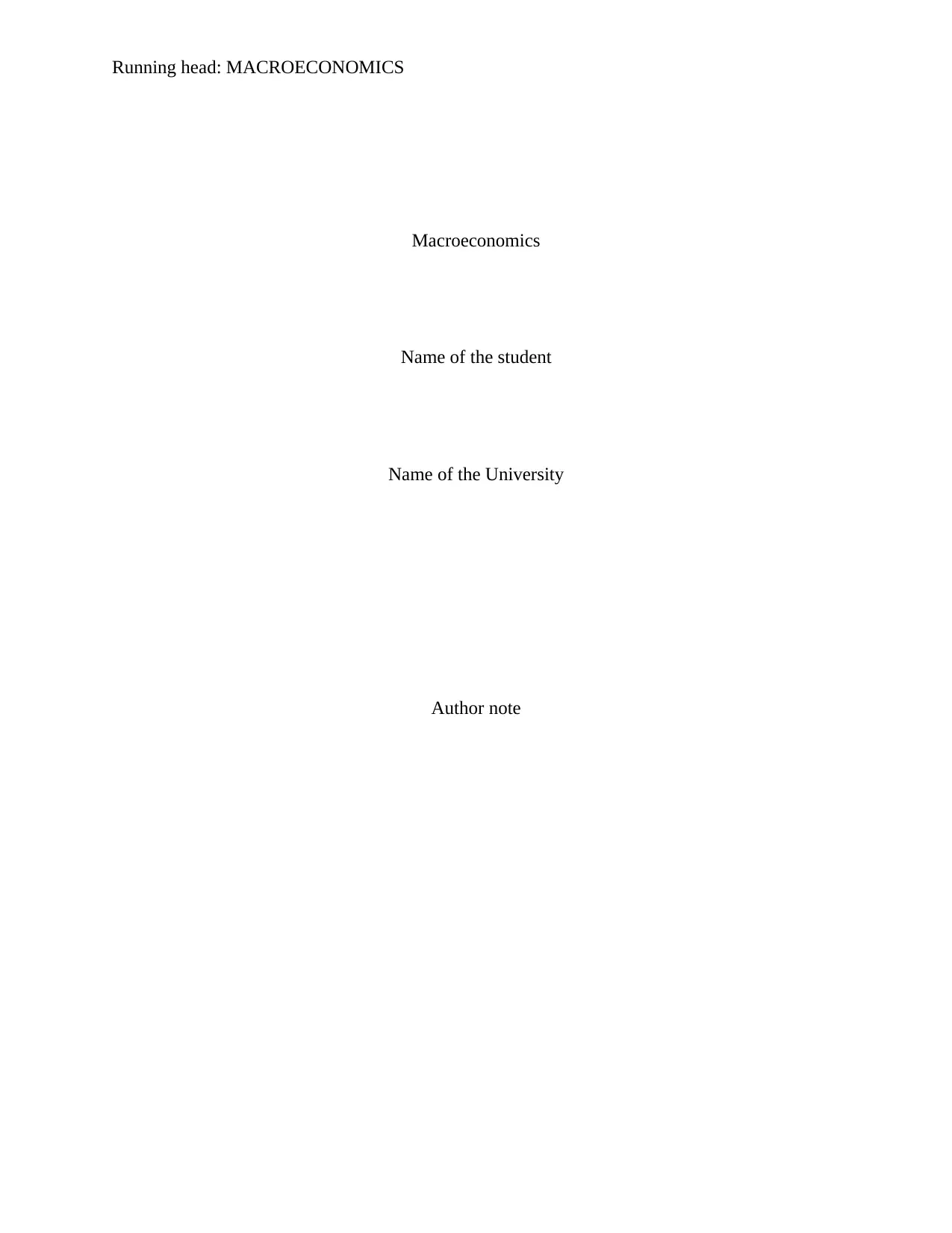
Running head: MACROECONOMICS
Macroeconomics
Name of the student
Name of the University
Author note
Macroeconomics
Name of the student
Name of the University
Author note
Paraphrase This Document
Need a fresh take? Get an instant paraphrase of this document with our AI Paraphraser
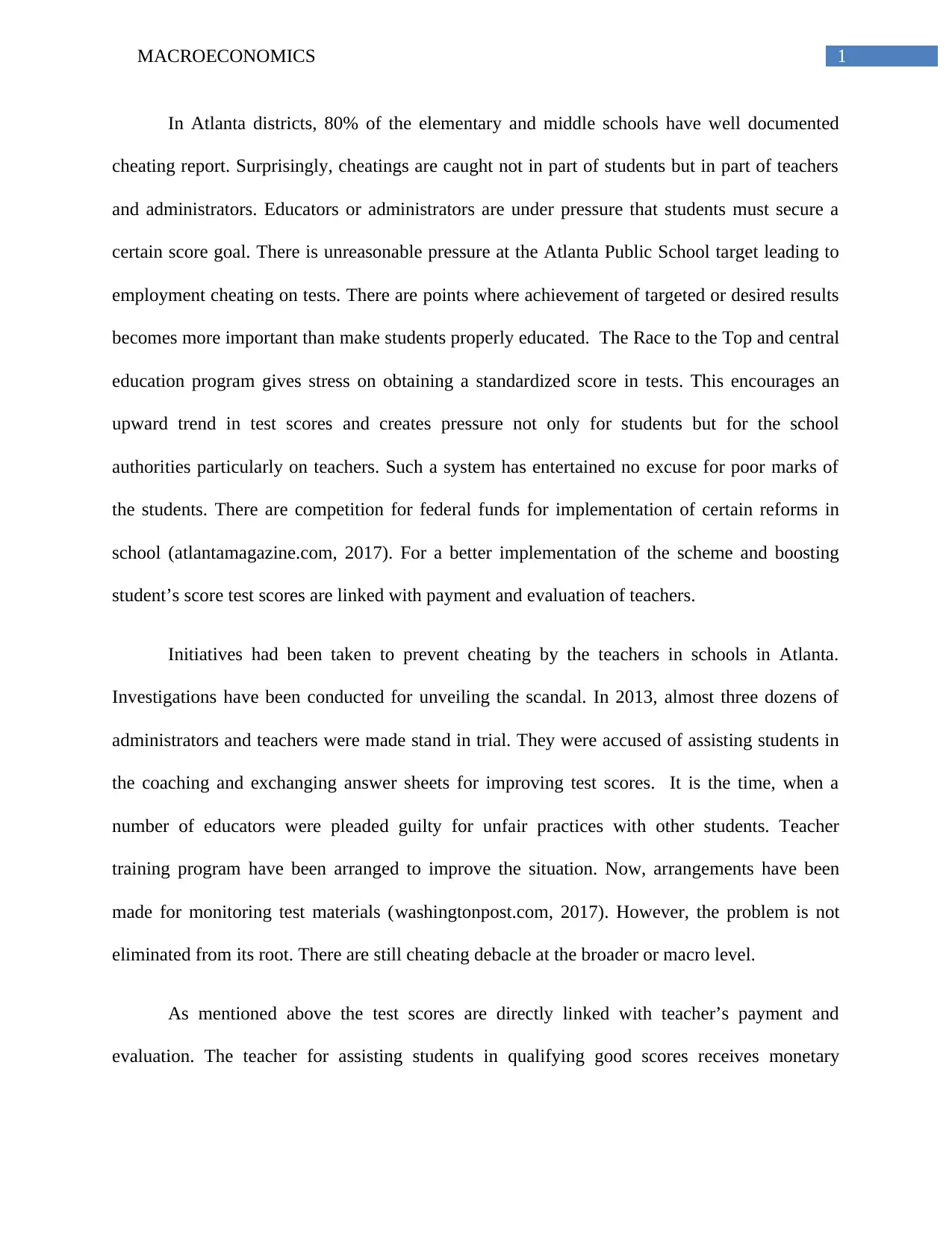
1MACROECONOMICS
In Atlanta districts, 80% of the elementary and middle schools have well documented
cheating report. Surprisingly, cheatings are caught not in part of students but in part of teachers
and administrators. Educators or administrators are under pressure that students must secure a
certain score goal. There is unreasonable pressure at the Atlanta Public School target leading to
employment cheating on tests. There are points where achievement of targeted or desired results
becomes more important than make students properly educated. The Race to the Top and central
education program gives stress on obtaining a standardized score in tests. This encourages an
upward trend in test scores and creates pressure not only for students but for the school
authorities particularly on teachers. Such a system has entertained no excuse for poor marks of
the students. There are competition for federal funds for implementation of certain reforms in
school (atlantamagazine.com, 2017). For a better implementation of the scheme and boosting
student’s score test scores are linked with payment and evaluation of teachers.
Initiatives had been taken to prevent cheating by the teachers in schools in Atlanta.
Investigations have been conducted for unveiling the scandal. In 2013, almost three dozens of
administrators and teachers were made stand in trial. They were accused of assisting students in
the coaching and exchanging answer sheets for improving test scores. It is the time, when a
number of educators were pleaded guilty for unfair practices with other students. Teacher
training program have been arranged to improve the situation. Now, arrangements have been
made for monitoring test materials (washingtonpost.com, 2017). However, the problem is not
eliminated from its root. There are still cheating debacle at the broader or macro level.
As mentioned above the test scores are directly linked with teacher’s payment and
evaluation. The teacher for assisting students in qualifying good scores receives monetary
In Atlanta districts, 80% of the elementary and middle schools have well documented
cheating report. Surprisingly, cheatings are caught not in part of students but in part of teachers
and administrators. Educators or administrators are under pressure that students must secure a
certain score goal. There is unreasonable pressure at the Atlanta Public School target leading to
employment cheating on tests. There are points where achievement of targeted or desired results
becomes more important than make students properly educated. The Race to the Top and central
education program gives stress on obtaining a standardized score in tests. This encourages an
upward trend in test scores and creates pressure not only for students but for the school
authorities particularly on teachers. Such a system has entertained no excuse for poor marks of
the students. There are competition for federal funds for implementation of certain reforms in
school (atlantamagazine.com, 2017). For a better implementation of the scheme and boosting
student’s score test scores are linked with payment and evaluation of teachers.
Initiatives had been taken to prevent cheating by the teachers in schools in Atlanta.
Investigations have been conducted for unveiling the scandal. In 2013, almost three dozens of
administrators and teachers were made stand in trial. They were accused of assisting students in
the coaching and exchanging answer sheets for improving test scores. It is the time, when a
number of educators were pleaded guilty for unfair practices with other students. Teacher
training program have been arranged to improve the situation. Now, arrangements have been
made for monitoring test materials (washingtonpost.com, 2017). However, the problem is not
eliminated from its root. There are still cheating debacle at the broader or macro level.
As mentioned above the test scores are directly linked with teacher’s payment and
evaluation. The teacher for assisting students in qualifying good scores receives monetary
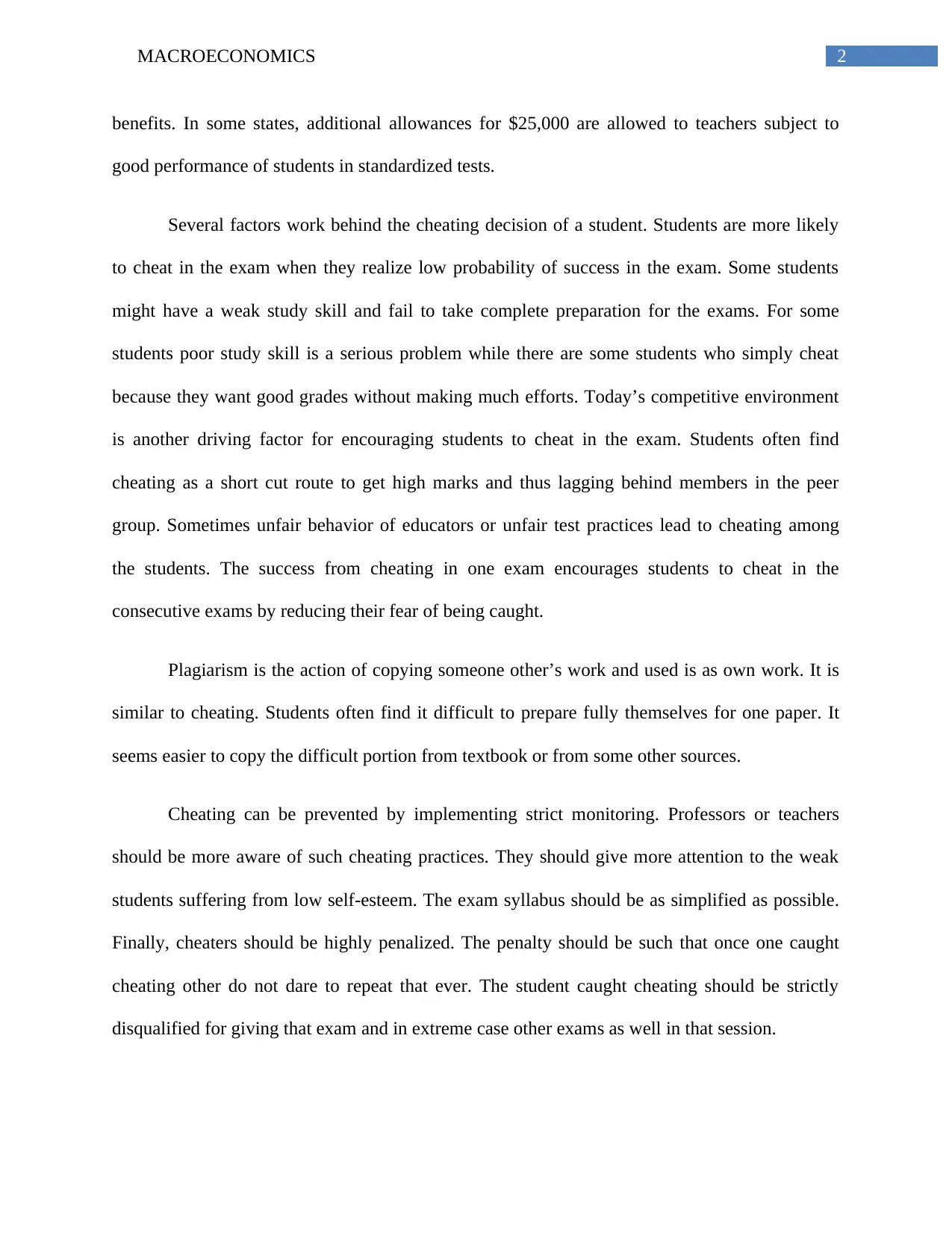
2MACROECONOMICS
benefits. In some states, additional allowances for $25,000 are allowed to teachers subject to
good performance of students in standardized tests.
Several factors work behind the cheating decision of a student. Students are more likely
to cheat in the exam when they realize low probability of success in the exam. Some students
might have a weak study skill and fail to take complete preparation for the exams. For some
students poor study skill is a serious problem while there are some students who simply cheat
because they want good grades without making much efforts. Today’s competitive environment
is another driving factor for encouraging students to cheat in the exam. Students often find
cheating as a short cut route to get high marks and thus lagging behind members in the peer
group. Sometimes unfair behavior of educators or unfair test practices lead to cheating among
the students. The success from cheating in one exam encourages students to cheat in the
consecutive exams by reducing their fear of being caught.
Plagiarism is the action of copying someone other’s work and used is as own work. It is
similar to cheating. Students often find it difficult to prepare fully themselves for one paper. It
seems easier to copy the difficult portion from textbook or from some other sources.
Cheating can be prevented by implementing strict monitoring. Professors or teachers
should be more aware of such cheating practices. They should give more attention to the weak
students suffering from low self-esteem. The exam syllabus should be as simplified as possible.
Finally, cheaters should be highly penalized. The penalty should be such that once one caught
cheating other do not dare to repeat that ever. The student caught cheating should be strictly
disqualified for giving that exam and in extreme case other exams as well in that session.
benefits. In some states, additional allowances for $25,000 are allowed to teachers subject to
good performance of students in standardized tests.
Several factors work behind the cheating decision of a student. Students are more likely
to cheat in the exam when they realize low probability of success in the exam. Some students
might have a weak study skill and fail to take complete preparation for the exams. For some
students poor study skill is a serious problem while there are some students who simply cheat
because they want good grades without making much efforts. Today’s competitive environment
is another driving factor for encouraging students to cheat in the exam. Students often find
cheating as a short cut route to get high marks and thus lagging behind members in the peer
group. Sometimes unfair behavior of educators or unfair test practices lead to cheating among
the students. The success from cheating in one exam encourages students to cheat in the
consecutive exams by reducing their fear of being caught.
Plagiarism is the action of copying someone other’s work and used is as own work. It is
similar to cheating. Students often find it difficult to prepare fully themselves for one paper. It
seems easier to copy the difficult portion from textbook or from some other sources.
Cheating can be prevented by implementing strict monitoring. Professors or teachers
should be more aware of such cheating practices. They should give more attention to the weak
students suffering from low self-esteem. The exam syllabus should be as simplified as possible.
Finally, cheaters should be highly penalized. The penalty should be such that once one caught
cheating other do not dare to repeat that ever. The student caught cheating should be strictly
disqualified for giving that exam and in extreme case other exams as well in that session.
⊘ This is a preview!⊘
Do you want full access?
Subscribe today to unlock all pages.

Trusted by 1+ million students worldwide
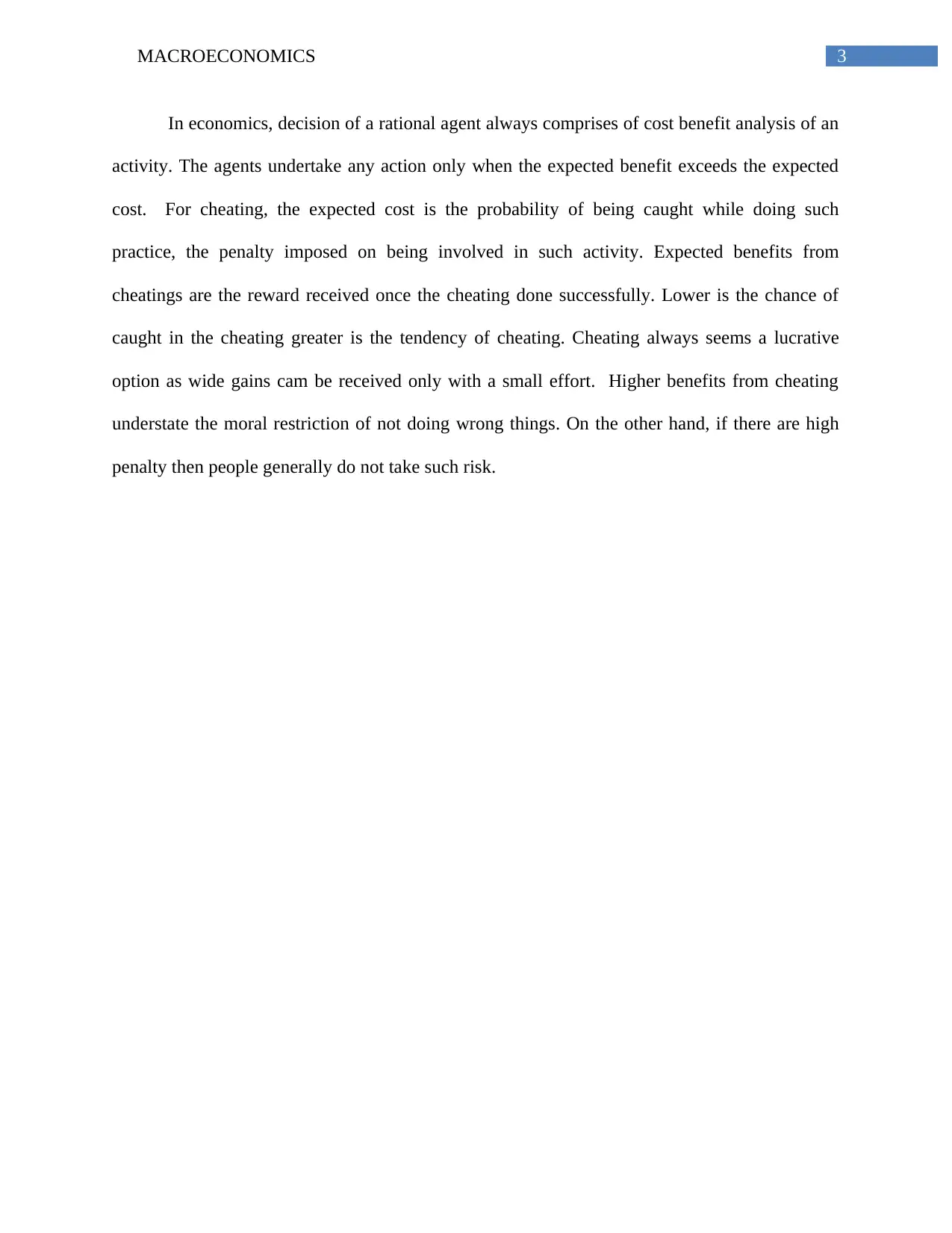
3MACROECONOMICS
In economics, decision of a rational agent always comprises of cost benefit analysis of an
activity. The agents undertake any action only when the expected benefit exceeds the expected
cost. For cheating, the expected cost is the probability of being caught while doing such
practice, the penalty imposed on being involved in such activity. Expected benefits from
cheatings are the reward received once the cheating done successfully. Lower is the chance of
caught in the cheating greater is the tendency of cheating. Cheating always seems a lucrative
option as wide gains cam be received only with a small effort. Higher benefits from cheating
understate the moral restriction of not doing wrong things. On the other hand, if there are high
penalty then people generally do not take such risk.
In economics, decision of a rational agent always comprises of cost benefit analysis of an
activity. The agents undertake any action only when the expected benefit exceeds the expected
cost. For cheating, the expected cost is the probability of being caught while doing such
practice, the penalty imposed on being involved in such activity. Expected benefits from
cheatings are the reward received once the cheating done successfully. Lower is the chance of
caught in the cheating greater is the tendency of cheating. Cheating always seems a lucrative
option as wide gains cam be received only with a small effort. Higher benefits from cheating
understate the moral restriction of not doing wrong things. On the other hand, if there are high
penalty then people generally do not take such risk.
Paraphrase This Document
Need a fresh take? Get an instant paraphrase of this document with our AI Paraphraser
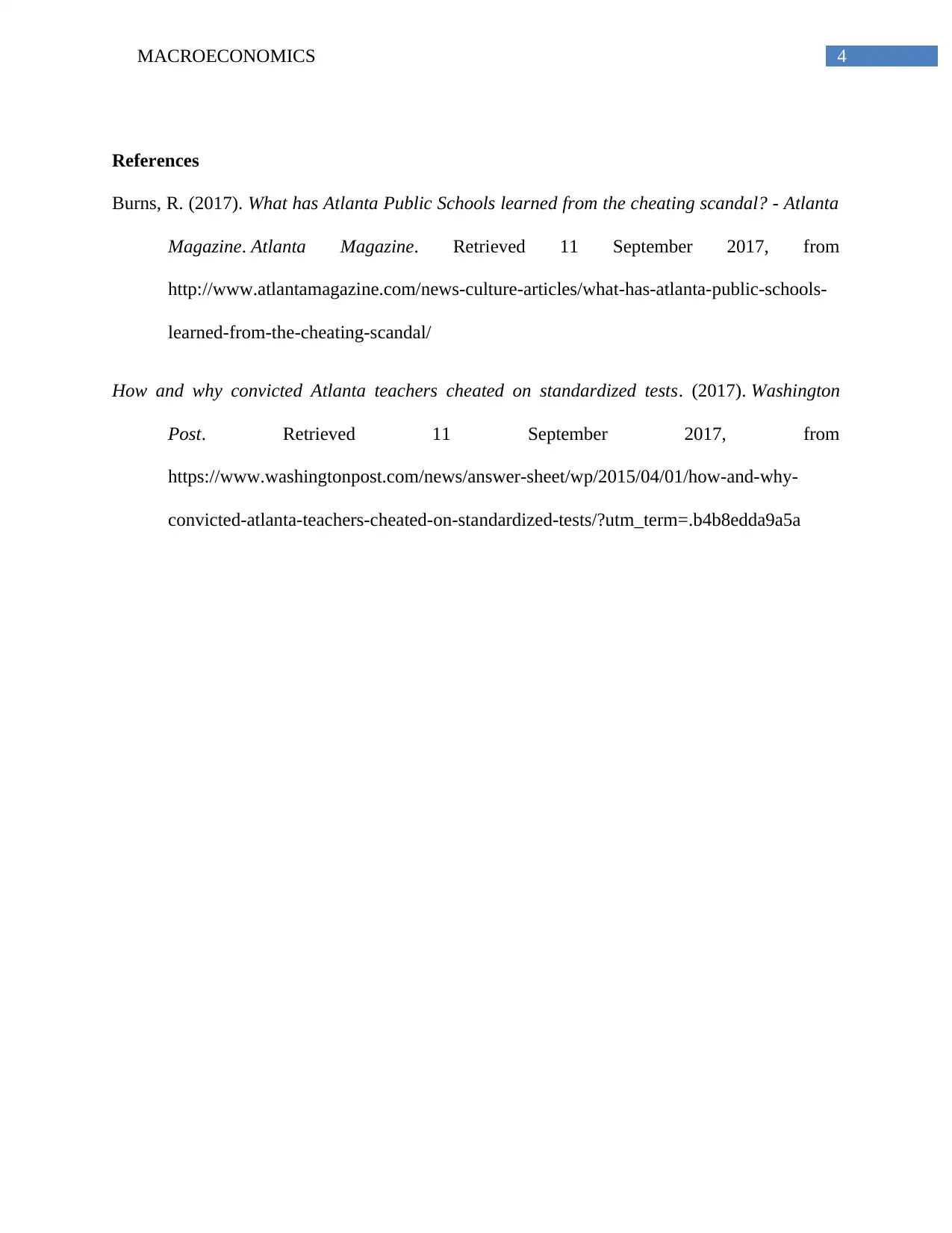
4MACROECONOMICS
References
Burns, R. (2017). What has Atlanta Public Schools learned from the cheating scandal? - Atlanta
Magazine. Atlanta Magazine. Retrieved 11 September 2017, from
http://www.atlantamagazine.com/news-culture-articles/what-has-atlanta-public-schools-
learned-from-the-cheating-scandal/
How and why convicted Atlanta teachers cheated on standardized tests. (2017). Washington
Post. Retrieved 11 September 2017, from
https://www.washingtonpost.com/news/answer-sheet/wp/2015/04/01/how-and-why-
convicted-atlanta-teachers-cheated-on-standardized-tests/?utm_term=.b4b8edda9a5a
References
Burns, R. (2017). What has Atlanta Public Schools learned from the cheating scandal? - Atlanta
Magazine. Atlanta Magazine. Retrieved 11 September 2017, from
http://www.atlantamagazine.com/news-culture-articles/what-has-atlanta-public-schools-
learned-from-the-cheating-scandal/
How and why convicted Atlanta teachers cheated on standardized tests. (2017). Washington
Post. Retrieved 11 September 2017, from
https://www.washingtonpost.com/news/answer-sheet/wp/2015/04/01/how-and-why-
convicted-atlanta-teachers-cheated-on-standardized-tests/?utm_term=.b4b8edda9a5a
1 out of 5
Related Documents
Your All-in-One AI-Powered Toolkit for Academic Success.
+13062052269
info@desklib.com
Available 24*7 on WhatsApp / Email
![[object Object]](/_next/static/media/star-bottom.7253800d.svg)
Unlock your academic potential
Copyright © 2020–2025 A2Z Services. All Rights Reserved. Developed and managed by ZUCOL.



